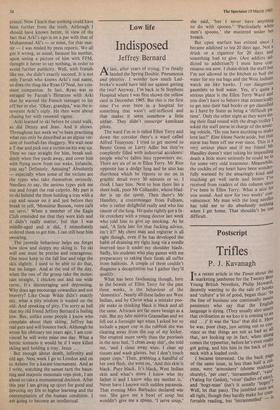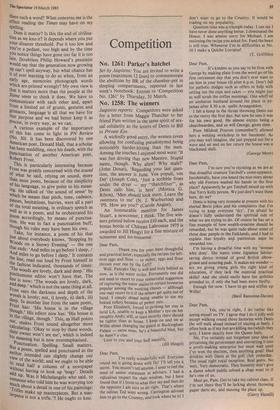Postscript
Trifles
P. J. Kavanagh In a recent article in the Times about the marketing jamboree for the Twenty Best Young British Novelists, Philip Howard, decently wanting to do the sale of books and 'culture' a bit of good, began thus: 'In the line of business one continually meets pessimists who say that the English language is dying. (They usually also assert that civilisation as we kno it is coming to an end ...)' It was the `kno' that did it. Here he was, poor chap, just setting out to con- vince us that things are not as bad as all that, are looking up in fact, when along comes the typesetter, before he's even really got going,
with a d
goiin n g, and hits e d h choi sm in the back of the I became interested. On the back page of the same issue, in less than half a col- umn, were 'atmoshere' (shome mishtake, shurely), 'per cnet', 'intrammelled', 'vate (Vating for Godot), `vitue' (ladies of easy)' and 'bogy-man' (isn't it usually `bogeY ' Well, let that pass). The jumbled ones are all right, though they hardly make for corn-
fortable reading, but Intrammelled' is
there such a word? What concerns me is the effect reading the Times may have on my sPelling.
Does it matter? Is this the end of civilisa- tion as we kno it? It depends where you put Your disaster threshold. Put it too low and You're a pedant, too high and by the time You notice things have gone too far it is too late. Doubtless Philip Howard's pessimist would say that the generation now growing uP can't spell anyway, but what chance has it of ever learning to do so when, from an early age, memories photograph words which are-printed wrongly? My own view is that it matters more than the people at the Stime seem to think it does. We have to communicate with each other and, apart from a limited set of grunts, gestures and grimaces, language is all that we have for that purpose and we had better keep it as precise, in every way, as we can. A curious example of the importance of this has come to light in PN Review (1‘10 30). It has been discovered by one American poet, Donald Hall, that a scholar has been meddling, since his death, with the Punctuation of another American poet, Robert Frost.
This is particularly interesting because Frost was greatly concerned with the sound of what he said, relying on sound, more than most poets, because of the simplicity of his language, to give point to his mean- ing. He talked of 'the sound of sense' by which he meant that pitch, tone, cadence, Pauses, hesitations, hurries, were all a part of the total meaning, in ordinary speech as Well as in a poem, and he orchestrated his Poem accordingly, by means of punctua- tion. He was in fact a punctuation buff, though his rules may have been his own. Take, for instance, a poem of his that just about everybody knows, 'Stopping by Woods on a Snowy Evening' — the one that ends: 'And miles to go before I sleep, / And miles to go before I sleep.' It contains the line, read out loud by Frost himself in the fashion indicated, thousands of times: The woods are lovely, dark and deep.' His Posthumous editor won't have that. The line is now: 'The woods are lovely, dark, and deep.' which is not the same thing at all. Frost says the darkness and depth of the woods is lovely; not, i) lovely, ii) dark, iii) deep. In another line from the same poem, Frost has: 'His house is in the village !hough.' His editor now has: 'His house is in the village, though.' This, as Hall points °tit, makes Frost sound altogether more calculating: 'Okay to stop by these woods, their owner won't see me', which is indeed Ills Meaning but is now overemphasised. Punctuation. Spelling. Small matters. uut a poem, spelled and punctuated as the author intended can slightly change our view of the world; and we ought to be able t0 read half a column of a newspaper Without having to look up 'bogy'. Details add uP. Was it Michelangelo who said, to someone who told him he was worrying too much about a detail in one of his paintings: trifles make up masterpieces. But a mas- terpiece is not a trifle.'? He ought to kno.











































 Previous page
Previous page